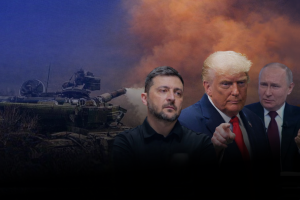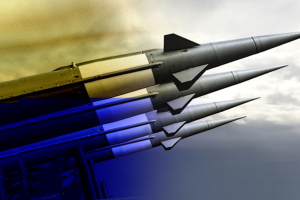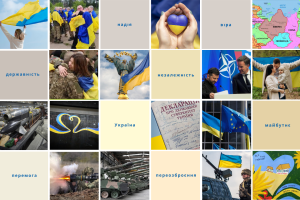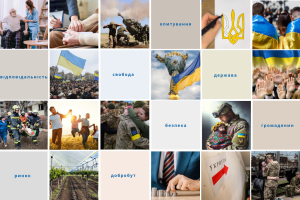2016: public opinion of Ukraine
A nationwide public opinion poll was conducted by the Ilko Kucheriv Democratic Initiatives Foundation jointly with the social service of the Razumkov Center over the period December 16-20, 2016 in all regions of Ukraine with the exception of Crimea and the occupied territories of the Donetsk and Luhansk oblasts. A total of 2,018 respondents ages 18 and up were polled. The theoretical margin of error does not exceed 2.3%.
The survey was financed within the framework of the MATRA project of the Embassy of the Kingdom of the Netherlands.
For comparison, data of polls conducted in different years by the Razumkov Center (in November 2014 jointly with the Ilko Kucheriv Democratic Initiatives Foundation) and in December 2014 by the Democratic Initiatives Foundation jointly with the Kyiv International Institute of Sociology were used.
- The main political event of 2016 in Ukraine was the Anti-terrorist Operation (ATO) (14% of the polled pointed to this). This was followed by the hike in municipal tariffs (8.5% of the polled) and the introduction of electronic declaration of incomes (8% of the polled). However, nearly one third of the polled could not name a single event.
- The main political event in the world was the U.S. Presidential Elections (37%). This was followed by the military intervention of Russia in Syria (11.5%) and wars around the world (11%).
- 5% of the people named Petro Poroshenko politician of the year 2016 in Ukraine. After him are Volodymyr Groisman (8%), Nadia Savchenko (7%), Oleh Lyashko (6%), Yulia Tymoshenko (5%) and Mikheil Saakashvili (4.5%). 40% of citizens did not name a single candidacy.
- 67% of the population feels that events in Ukraine are going in the wrong direction. (58% in 2014, 68% in 2015), 16% are confident that events are developing in the right direction (22% in 2014, 15% in 2015) and 17% (20% in 2014, 17% in 2015) were undecided about their opinions.
- In the opinion of citizens, the situation in the majority of spheres of life in Ukraine significantly worsened in 2016. The most negative changes transpired in the level of prices and tariffs – here 5% of the population noted that the situation worsened, in the economic situation in Ukraine 77%, , in the level of stability (75%), the confidence of citizens in tomorrow (74%), in the level of well-being of families (73%). Besides that, worsening of the situation was mainly noted in the sphere of crime (62%), in the sphere of citizens’ attitudes towards the ruling power (59%), in healthcare (54%), in wages (54.5%), in social security (49%), in pension security (49%), compliance with the law by civil servants (43%). The situation in such spheres as the state of the Russian-speaking population (69%), the state of the Ukrainian-speaking population (70%), the state of religious and ethnic minorities (64%), inter-racial relations (64%), the level of freedom of speech (49%), the level of democracy (46%), compliance with rights and freedoms (46%, education (43%) remained mainly unchanged. The only sphere in which citizens noted an improvement in the situation was the country’s defense capacity – changes for the better were noted by 40% of the population (changes for the worse – 21%). The opinions of Ukraine’s international image were divided: 27% of citizens feel the country’s image changed for the better, 32% -- for the worse and 27% think that their country’s image did not change at all. On the whole, in the opinion of 73% of the population the situation in the country changed for the worse (in 2015 – 74%).
- If to compare with 2015, in the public opinion the greatest changes for the worse were noted in the situation with crime (in 2015, 47% of the population felt the situation worsened, in 2016 – 62%), in pension security (40% and 49%), in social security (40% and 49%).
- Only 17% of the population is confident that Ukraine is capable of overcoming the existing problems and hardships in the nearest several years, 49% feel this will happen, though in the more distant future, while 19.5% are in general convinced in the country’s incapacity.
- In 2016, volunteer organizations enjoyed the greatest level of trust of citizens – trust dominated distrust by 44%. In general, institutions associated with defense of the country have the trust of citizens: The Armed Forces of Ukraine (the ratio of trust-distrust in the country is +36%), in voluntary battalions (+33%), the National Guard of Ukraine (+28%), the State Border Service (+12%). A positive ratio of trust of the people is also enjoyed by the Church (+30%), non-government organizations (+8.5%), the patrol police (+5%), the mass media of Ukraine (+4%).
- The highest level of distrust is noted in the mass media of Russia (–78%), the state apparatus (–74%), the courts (–72%), commercial banks (–73%), the National Bank of Ukraine (–65%), the Verkhovna Rada of Ukraine (–69%), the Prosecutor General’s Office (–67%), political parties (–67%). Further in terms of the level of distrust are: the government of Ukraine (–55%), the President of Ukraine (–45%), the police (–44%), oblast state administrations (--34%), district state administrations (–28%), labor unions (–27%), the National Anti-corruption Bureau of Ukraine (–29%), western mass media (–22%), the security service of Ukraine (–20%), the Authorized Plenipotentiary of the Verkhovna Rada on Human Rights (Ombudsman) (–12%), bodies of local self-government (–11%).
- At the end of 2016 there was not a single political leader in Ukraine in whom the level of trust did not dominate over distrust. Citizens expressed the highest level of distrust in Valeria Hontareva (the trust-distrust ratio was –80%), Arseniy Yatsenyuk (–72%), Arsen Avakov (–71%), Oleksandr Turchynov (–61%), Yuriy Boiko (–60%). Further in terms of the level of negative attitude are: Oleh Lyashko (–54%), Nadia Savchenko (– 53%), Yulia Tymoshenko (–50%), Vadym Rabinovych (–50%), Mikheil Saakashvili (–48%), Dmytro Yarosh (–48%), Petro Poroshenko (–44%), Yuriy Lutsenko (–43%), Andriy Parubiy (–43%), Vitaliy Klitschko (–41%), Volodymyr Greusman (–37%), Andriy Sadoviy (–35%), Oksana Syroyid (–32%), Valeria Lutkovska (–32%). The ratio of trust-distrust in Iryna Herashchenko looks relatively better (–22%) and Anatoliy Hrytsenko (–20%), though the negative factor there dominates.
- The initiative of holding snap parliamentary elections enjoys the support of 46% of the population, while 37% do not support this initiative. In the event that snap elections are held 63% of the population expressed its readiness to come out an vote.
- If elections to the Verkhovna Rada will be held in the nearest week, the following would overcome the 5% threshold: Batkivshchyna party (11%), the Petro Poroshenko Bloc party (9%), the Opposition Bloc party (9%), the Radical Party of Oleh Lyashko (7.8%), the Samopomich party (7.6%), the For Life party (5.7%), the Citizens’ Position party (5.4%). Those parties associated with Mikheil Saakashvili (in the poll the Khvylya party – 4.7%) also have a chance of overcoming the threshold. At the same time, all parties have a 16.5% reserve of voters that remain undecided.
- The initiative of holding snap presidential elections is supported by 47% of the population, while 38% do not support the initiative. If snap elections are held 65% of the population expressed its readiness to come out and vote. 11.9% of voters are ready to vote for Petro Poroshenko, Yulia Tymoshenko – 11.1%, Yuriy Boiko – 8.4%, Anatoliy Hrytsenko – 7.2%, Oleh Lyashko – 6.1%. 19% of those that plan to participate in the elections are undecided about their choice.
- The majority of the population of Ukraine (62%) feels that Ukraine needs new political leaders. At the same time, only 19% see such leaders. In open polling (in which respondents mentioned their surnames the following were named the most frequently: Nadia Savchenko (11.4%), Mikheil Saakashvili (10.8%), Yevhen Murayev (7.9%), Vadym Rabinovych (7.1%), Oleh Lyashko (6.3%), Yegor Sobolev (5.6%).
- Public opinion highlights the following five issues as the main ones on which the ruling power must first and foremost concentrate its efforts: regulation of the situation in the Donbas and reach peace (75%), regulate prices and reduce tariffs (56%), stimulate the development of the economy and create favorable conditions for business (48%), the fight against corruption and corrupt individuals (46%), raise pensions and salaries (42%).
- 35% of the population (11% – “how much it takes” and another 25% – no more than a year) is ready to tolerate certain material hardships for the sake of the success of reforms. 55% are not ready to tolerate hardships for the sake of successful reforms (24% – because they do not believe in success, 31% – because their material standing is already intolerable).
- 23% of the population believe that in their city (village) there will be mass acts of protest in the nearest future (4% of them are sure of this, while 19% feel that this is possible). Meanwhile, 39% feel that mass protests in the foreseeable future are highly improbable, while 22% are sure that there will not be any protests.
- If rallies and demonstrations take place, 20% of the population is ready to participate in them (4% – absolutely and another 16% – most likely). 62% are not ready to take part in protests. At the same time, 38% of the population presumes the possibility of a new Maidan – 1 next year.
- The European orientation of the people of Ukraine is constantly growing: while in December 2013 47% of the population were in favor of Ukraine’s accession to the European Union and 36% were in favor of Ukraine joining a Customs Union, in December 2016 only 11% of the population supported Ukraine’s joining a Customs Union and 58% gave their preference to joining the European Union.
- Introduction of a visa-free regime is important for 44% of Ukrainians, while it is not important for 50% of the people.
- The population feels Ukraine’s accession to NATO to be the main variant that would guarantee the country’s security (44% of the population feels this way). 26% of the people place their hopes on a neutral status, while 6% support the prospect of a military union with Russia and other countries.
- If in the foreseeable future a referendum on Ukraine’s accession to NATO were held, 62% of the population would participate in it among which 71% would vote “in favor” and,23% -- “against” (6% are undecided).








